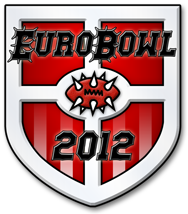

 |
| Rules |
| Participants |
| Contact us |
| Results 2012 |
| Downloads |
| Past EuroBowls |
 |
Rules
National teams A national team consists of 8 coaches, who each play his own bloodbowl team throughout the tournament. The coaches have to play 8 different races from the BB team lists. At least 5 of a national team's coaches must be citizens or residents of the nation in question. If you are not able to field 8 coaches from your country, we allow the use of up to 3 "freebooters" which preferably should have some relation to your country, teams that use more than 2 freebooters are however not eligible as host for the next Eurobowl. |
Basic rules We play according to the Comp. Rules pack unless something else is stated here or in the info folder send to everyone about a week before the event takes place. |
Team creation All the official races from Comp. Rulespack as well as Chaos Pact, Slann and Underworld can be used. You have 1100000 gp to buy a team. Goblins can buy 0-3 bribes at 50.000, and Halflings can buy the chef at 100.000. No other inducements are allowed for any races. No team values are ever calculated. |
Start skills (handicap) Some teams start with skills according to the following tiers. Tier one gets no starting skills, tier two gets one starting skill, and tier three gets two starting skills. Tier one, 0 start skills: All races not in tier two or three. Tier two, 1 start skill: Chaos, Chaos Pact, Elf, High Elf, Human, Khemri, Nurgle, Slann. Tier three, 2 start skill: Goblin, Halfling, Ogre, Underworld, Vampire. Allocate your start skills on your team roster (and mark the players) when submitting the roster. No player can receive more than one skill. |
Team development All games are played without post-match procedures and thus without winnings, player purchases etc. All injuries and earned star player points are waived after each game. So each game starts with the same players on the roster. In the beginning of the pre-game sequence before round 1 and round 4 three skills may be assigned. These skills must be assigned to players that has not yet gained a skill in the tournament. When you assign skills before round 4, one of these can be given as if you had rolled a double on the skill roll, the rest of the skills must be available to the player on any skill roll. Both coaches note down their skill choices and the players getting the skills. Then they reveal the choices simultaneously. No player can receive more than one skill. |
Tournament format The tournament consist of seven rounds. In each round the national teams are paired up. Teams are paired by Swiss-draw in round two to seven. In the first round draws are made from two groups. Teams are grouped according to their average team performance in the last five Eurobowls. The best half of the teams rounded down to an equal number is in the top group. The rest is in the bottom group. Any teams that did not participate in a Eurobowl in this period are put in the bottom group. Teams are randomly paired up with a team from the group they are in. The individual match-ups are decided randomly in the first round and by Swiss-draw thereafter. 1 point is awarded for a victory, ― for a draw and 0 for a defeat. Winning the team match gains the winning team a +1 bonus point to their team score. |
Tie breaker In the case of equal point score in the table of standings the following tie-breaker is used: - first sort by mutual game (if possible) - then by sum of opponents' points - last by best (TD+cas) net score. Please note here that only casualties that would yield star player point counts. In order to make it easier to count casualties lie players down in the casualty box if they do not count towards the final score. In the case of players with regeneration that have regenerated a counting casualty you should place a counter in the casualty box to represent this. |
Rules for fairplay In order to ensue a tournament in good sport and the best fun for everybody there are a series of rules that can be agreed upon by both coaches in their mutual game. A rule you have agreed upon is fixed afterwards - unless both coaches agree to cancel it again. Aside from this there is also a single rule to ensure both coaches feels the dices are, if not even, at least the same. 1) You must allow your opponent to use your dice if he so wishes. 2) Illegal procedures can be called if both coaches agree to enforce the rule. 3) If the game comes under the time rules (see below). You can mutually agree that a player who runs out of time isnīt forced to abandon all voluntary actions. In that case both players share the same time pool and the game will end when the time runs out, and the current score at this time will count. |
Paint and miniatures Painted miniatures are not mandatory (though we urge you to do so). Those teams, that by the tournament staff are deemed painted (ie ALL miniatures are painted and flocked to a sufficient standard.) will get +1 Cheerleader and +1 Assistant Coach. This will take effect from round 2 - during the first round the referees will review the teams' miniatures as they play. The miniatures doesn't have to be original GW-minis. However the miniatures must be representative for the roster's race and players (ie a Norse thrower must look like a Norse thrower) and be easily recognizable from other positionals. We encourage you to use the following color coded bases: Grey/none: Lineman Red: Blitzer Green: Blocker White: Thrower Yellow: Catcher, Runner If your opponent can't easily recognize the different player types on your team, you must let him mark them somehow (without damaging the miniatures, of course). This could be with bottle caps or colored rings etc. |
Time rule With about 30-40 minutes left of the round the Orcanizers will be checking up on all games. If a game has not reached a suitable point you will be handed a clock (chess clock) with an equal amount of time for you and your opponent (half of the time left in the round for each). The time you are given is the time you have for the rest of your turns combined. If you run out of time you may not make any voluntary actions i.e. you may not say attempt interceptions or take any actions, but you may say roll armor rolls if your opponent knocks himself over. Note that this can potentially allow your opponent to have several turns in a row. |
Being late If you are more than 30 minutes late your opponent is entitled to force you to concede. Winning a game this way gives a 1-0 win (TD wise) and 0-0 on the casualty tiebreaker. If you are more than 15 minutes late and the time rule is enforced you will only get 1/3 of the remaining time and your opponent will get 2/3 of the remaining time. |
